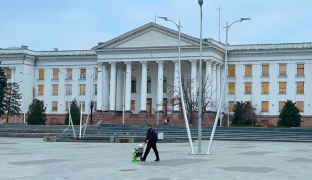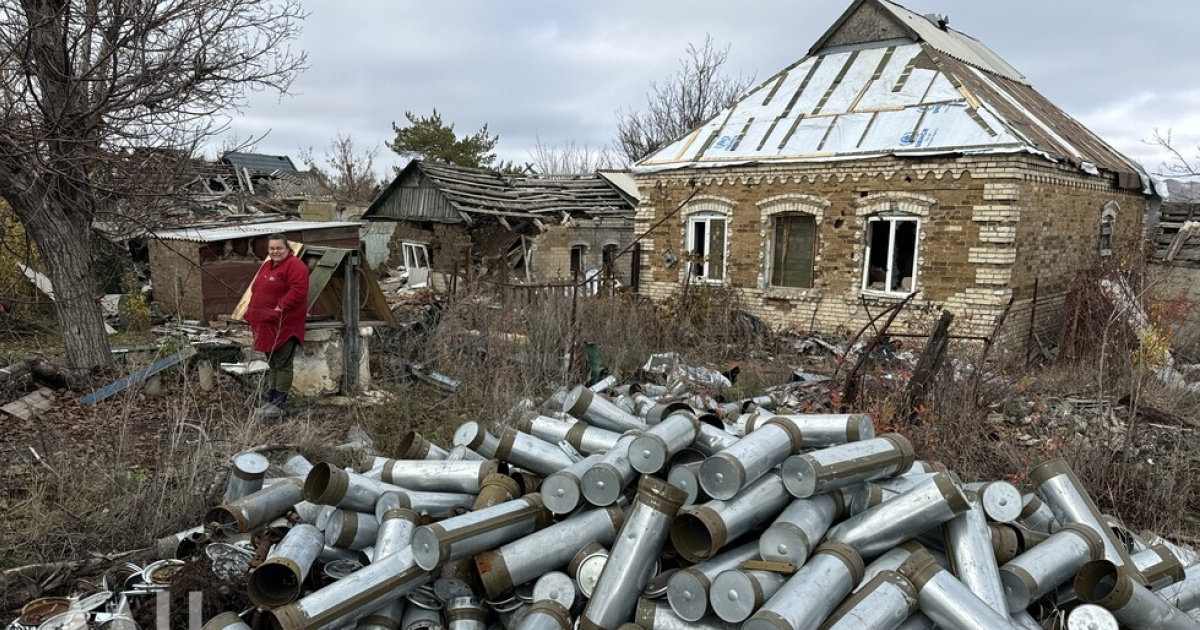The Ukrainian economy will never be the same again. The war completely changed it and a return to the old structure is impossible in general. Big industry, the legacy of the Soviet past, is finally receding into this very past.
According to government officials, more modern and promising industries should take its place. The relevant opinion was voiced by Prime Minister Denys Shmyhal at the September Yalta European Strategy Forum in Kyiv.
Deoligarchization: final
The Cabinet of Ministers intends to financially support the development of the agricultural sector, the military-industrial complex, renewable energy industry, the IT sector, and small and medium-sized businesses. There are no metallurgy and mechanical engineering (with the exception of the military-industrial complex) among the listed areas of future budget support.
This approach seems logical. The majority of Ukrainian metallurgical enterprises belong to R. Akhmetov’s Metinvest group. Not so long ago, he announced through his top manager Y. Ryzhenkov (Metinvest’s CEO) that the company does not intend to invest in the development of Ukrainian metallurgy. Until he, R. Akhmetov, together with his managers, is convinced that the victory over russia is final and irrevocable. It is worth noting that Y. Ryzhenkov spoke differently earlier: he promised to rebuild the destroyed Azovstal plant after the liberation of Mariupol.
Now, Metinvest’s CEO announced plans to build a new full-cycle steel plant (including steelmaking) in the EU’s Bulgaria or Italy instead.
R. Akhmetov expects that the enterprise will work on iron ore from Kryvorizkyi Iron Ore Basin, where most of the mining and processing plants belong to him.
Since the group has such plans and the preliminary decision can be considered accepted, it is quite obvious that convincing the richest Ukrainian billionaire to invest hundreds of millions of dollars in the Ukrainian economy, and not in the European one, is a waste of time.
The new business model of Metinvest and R. Akhmetov is extremely clear: to use Ukrainian resources (iron ore) as a raw material appendage, and to create added value from these resources in the European Union. Accordingly, the main tax deductions and jobs will be there.
It is also obvious that in this situation, it makes absolutely no sense for the government to include metallurgy into the list of priority sectors for post-war development.
Earlier, OstroV noted that under the management of an "efficient private owner" and his managers, Ukrainian metallurgy got hopelessly behind foreign competitors in terms of innovation.
Ukrainian steel companies are present on foreign markets mainly as suppliers of semi-finished products. And they were kept at the expense of hidden state subsidies: understated tariffs for cargo transportation, port dues, rent payments, etc.
President Volodymyr Zelensky does not intend to continue this practice. Therefore, rent and freight rates for Ukrzaliznytsia Ukrainian Railways were raised last year. The decision looks very logical: after all, the money saved was not used to introduce innovative technologies, but was withdrawn in the form of dividends for profit.
And, perhaps, now we can say that the ship has sailed: it is already unrealistic to close the gap in the quality of Ukrainian steel and rolled metal compared to European, Japanese and South Korean manufacturers.
In general, Ukrainian mechanical engineering enterprises are in the same situation. This is also a Soviet legacy, which was fully exploited by the new owners after privatization.
Yet again, without investing in new technologies. The money was directed only to improve the existing ones. It is clear that this did not require significant investments, but for a time it allowed to maintain presence in foreign markets (mainly in the CIS).
OstroV also noted the silence of I. Kolomoyskyi’s Privat group regarding the prospects for restoring the Kremenchuk Oil Refinery, which was destroyed by russian missile attacks.
All of this means the loss of influence of the oligarchs on the Ukrainian economy and, accordingly, political influence, without which it is impossible to continue receiving unreasonable state favors.
Yes, R. Akhmetov, V. Novynskyi, I. Kolomoyskyi also have assets in the agricultural sector. But they are not undisputed leaders there, as they were in metallurgy or oil refining. And they are unlikely to be able to become leaders given the reluctance to invest in advanced technologies.
Agricultural sector: not falling into the same trap
The post-war development of the agricultural sector also looks very logical. In recent years, this industry has become a real "locomotive" of the economy, replacing metallurgy. Serious investments were made there.
They concerned not only the purchase of new high-quality agricultural equipment, but also the development of related infrastructure: grain elevators, port transshipment hubs’ facilities, etc. The share of agricultural products in export earnings has been constantly increasing and now, in war conditions, this is their main source.
At the same time, it should be noted that the structure of agricultural exports is in many respects similar to metallurgy. Mostly grain is sent to foreign markets (that is, raw materials) and not let's say flour or pasta.
Unfortunately, so far there has been little progress in this direction. For example, in early September, the Minister of Agrarian Policy Mykola Solsky announced joint plans with the Polish authorities to build a 600 km trans-border oil pipeline.
It is assumed that up to 2 million tons of sunflower oil per year will be able to flow to Polish ports through the future pipeline. At the same time, OstroV previously noted that Turkey was one of the main buyers of Ukrainian sunflower oil before the war and the port blockade.
The business model of Turkish companies is extremely simple: they buy a tanker of Ukrainian oil, bottle it at their own facilities and sell wholesale lots to retail chains.
Of course, such products in small packages, intended for the final consumer, are much more expensive than the same oil in tankers.
In this regard, it would be better for the Ministry of Agrarian Policy and the Cabinet of Ministers to think about how to stimulate the development of such packaging facilities in Ukraine, not about the oil pipeline construction.
The same goes for the grain industry. Now Turkey is the flour export world’s leader. A large number of flour mills have been built there. They work on Ukrainian grain.
Accordingly, the Turkish economy generates added value, while the Ukrainian one simply acts as a supplier of raw materials for it.
Former Prime Minister Volodymyr Groysman was the first to speak about the need to stimulate the export of products with high added value, but no significant progress has yet been made.
Meanwhile, the rhetoric of the current head of government is alarming. At the Yalta European Strategy Forum, he stated: "Support for Ukrainian manufacturers may become our national philosophy".
The key word is "may". It may become, or it may not. If the prime minister had said "it will be our national philosophy", it would have sounded much more encouraging. In the meantime, the Ukrainian agricultural sector, despite the impressive growth in production volumes, remains mainly a raw material exporter.
However, on September 26, First Deputy Minister of Agrarian Policy Taras Vysotsky said that "the point of no return to the raw material model (agricultural export) has been passed". According to him, projects for the flour and pasta production have been launched. Though the result will be seen no earlier than in 2-3 years.
Let’s hope that it will be so. In any case, the port blockade of Ukraine encourages farmers to export finished products even more than state support programs. Since for the export of the same pasta you do not need ocean bulkers as you do for grain. Railway wagons would suffice.
IT rules
The bet on the development of the IT industry looks absolutely logical. This is the most dynamically developing sector and "virtuality" of such a business should not be seen as a discouragement.
A glance at the financial statements of the largest Internet companies like Google, Amazon, Microsoft, Meta (formerly Facebook) and others should be enough.
Amazon has an annual income of $469.8 billion, Google - $257.6 billion, Microsoft - $168 billion and Meta - $85.96 billion. For comparison: the annual income of the world's largest metallurgical concern ArcelorMittal (2021) is $76.5 billion.
According to the Ministry of Economy, Ukraine's export earnings from the work of IT companies reached $6.7 billion at the end of 2021. And what is important, the IT sector was the least affected by the war with only 10% drop in sales.
In comparison, the January-August 2022 iron ore exports dropped by 60.9% in tons and by 77.9% in USD. So the IT sector can really become the new "backbone of the Ukrainian economy" by replacing metallurgy.
The focus on renewable energy industry is also logical. This is a global trend and it would be strange to continue to focus on coal energy against the backdrop of the developed countries’ refusal from it.
And the adoption of laws there that make it unprofitable to use environmentally "polluted" electricity in the production of industrial products. First of all, we are talking about the new European СВАМ carbon tax, which will begin to be collected from such producers as early as 2023 when their products are exported to the EU.
Before the war, "green" energy industry in Ukraine was developing at a rapid pace, with really big investments of about $12 billion in total.
Growth was provided by government incentives. However, the moment came when the state could no longer fulfill its earlier obligations (to buy "green" electricity at the highest tariffs in Europe).
Therefore, in 2020, the "green" energy companies signed a memorandum with the Cabinet of Ministers on a temporary reduction in tariffs. In the same year, these conditions were enshrined at the legislative level: the Verkhovna Rada adopted the relevant law.
Thus, the obstacle to the further development of Ukrainian wind and solar electricity production was removed.
And finally, the bet on the future development of small and medium-sized businesses, rather than large corporations looks absolutely justified. Firstly, we must fully agree with D. Shmyhal that only small and medium-sized businesses are able to quickly create a large number of jobs.
The problem of employment against the backdrop of the post-war return of millions of refugees will indeed be very acute. Secondly, the focus on small and medium-sized businesses means a decrease in the economic influence of the oligarchs.
The very same ones who are now threatening the government with halting a few large factories if they do not receive new state incentives.
It is worth noting that even before the war, much was done specifically for small and medium-sized enterprises. The Cabinet of Ministers and the parliament have carried out serious work on deregulation, i.e., the reduction of administrative procedures for starting and running such a business.
A number of laws on industrial parks adopted and enforced in 2021 was powerful springboard for it. That is, all the prerequisites for the growth of small and medium-sized enterprises and increasing their share in the Ukrainian economy have already been created.
In this case, the post-Soviet oligarchs should finally lose their economic weight and go straight to the historical archive.
Vitaliy Krymov, OstroV





